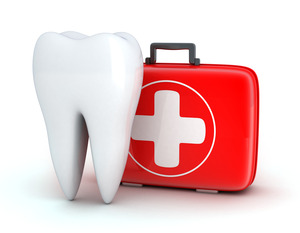
It can sometimes seem like dental emergencies crop out of nowhere, but this is very rarely the case. Most of the time a toothache or broken oral appliance are a result of long-standing health problems, which means that if you’re smart about your dental hygiene you may be able to prevent almost all of them.
The most painless and cost-effective way to deal with a dental emergency is to prevent it in the first place. Here’s are a few steps you can take to make that happen.
Regular Dental Check-ups and Cleanings
Scheduling regular dental check-ups and cleanings is essential for preventive care. Dentists can detect potential issues early on, such as cavities, gum disease, or cracked teeth, and address them before they escalate into emergencies. During these visits, dentists also perform professional cleanings to remove plaque and tartar buildup, which can lead to tooth decay and gum problems if left untreated. By attending these appointments every six months or as recommended by the dentist, individuals can maintain optimal oral health and minimize the likelihood of dental emergencies.
Adopting a Good Oral Hygiene Routine
Practicing good oral hygiene at home is key to preventing dental emergencies. This includes brushing teeth at least twice a day with fluoride toothpaste, flossing daily to remove food particles and plaque between teeth, and using mouthwash to rinse away bacteria. Additionally, individuals should avoid harmful habits such as smoking and excessive consumption of sugary or acidic foods and beverages, as these can contribute to tooth decay and gum disease. By prioritizing oral hygiene, individuals can strengthen their teeth and gums, reducing the risk of dental issues that may lead to emergencies.
Wearing Protective Gear During Physical Activities
Engaging in sports or recreational activities without adequate protection can increase the risk of dental injuries. Wearing a mouthguard while participating in contact sports such as football, hockey, or basketball can help prevent broken or knocked-out teeth, as well as injuries to the lips, tongue, and jaw. Similarly, individuals who grind their teeth at night should consider wearing a custom-fitted nightguard to protect their teeth from damage. By wearing appropriate protective gear, individuals can minimize the likelihood of dental emergencies resulting from accidents or habits that put their teeth at risk.
About the Author
Dr. Teresa Knott has well over 20 years of experience as a dentist, and being able to use her skills to help people who need it makes her job incredibly rewarding. She brings a gentle touch to her practice, making her particularly adept at dealing with painful dental emergencies. Dr. Knott received her dental degree from the University of Texas Health Science Center in San Antonio. To stay at the top of her field, she is a member of the Texas Dental Study Club.
If you have any questions about a dental emergency, she can be reached at her website or by phone at (972) 530-5200.
